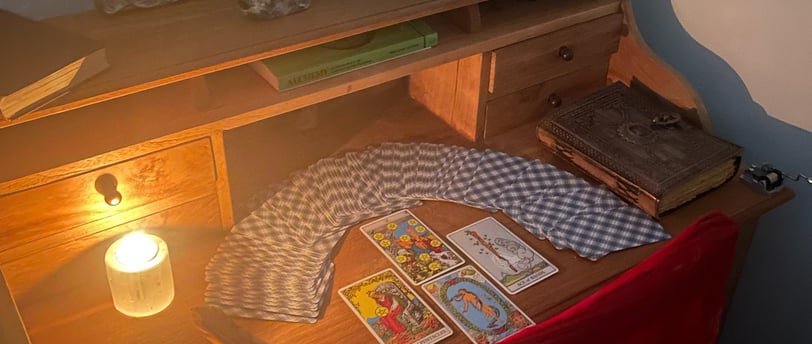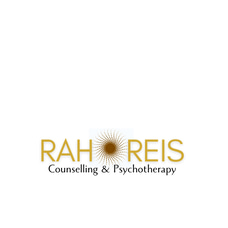The Role Of Dysfunctional Ego - A Tarot Analysis
5/4/20255 min read


Tarot is a powerful tool for understanding life, and you can find its wisdom anywhere—if you’re open to it. Today I’m going to show you how to interpret cards under some psychological aspects. You can read books or watch a movies or even overhearing conversations on the streets. If you are able to picture tarot cards in any life situation, that means you are becoming a an advanced tarot reader.
Pay attention to the signs around you can spark insights that deepen your tarot practice.
For example , I was reading a book the other day called A New Earth by Eckhart Tolle. In this book, he talks about the concept of the dysfunctional ego—how it can distort our perception of reality and interfere with genuine presence in everyday life. Tolle describes the ego as a mental state that is over identified their thoughts and emotions. So it’s that mental state in which the individual believes that know what’s in everyone’s head. Also is constantly seeking validation, approval, or a sense of superiority (or inferiority) relative to others.
As I was reading about the concept of dysfunctional ego I couldn’t avoid having some tarot cards popping into my mind so in this video I’m going to make tarot card interpretations through the lens of the dysfunctional ego that was based on this book.
So , let’s review what has been said about the role of the ego and connections with the tarot cards
The ego helps us feel like an individual
According to Carl Jung, the process of individuation starts in early childhood to develop that feeling sense of separation from the mother. it’s what gives us a sense of 'I' or 'me.' It helps us understand who we are in relation to others and the world around us. It is the ego that uses our memories to create stories about who we are.
For example, the ego gives you a sense of identity: 'I am a teacher,' ‘I am a lawyer’ ‘I am a dancer’, or 'I am a creative person.' It shapes how you see yourself and how you interact with others.
The cards in tarot that strongly relies on their occupations that they are really proud and take themselves seriously are: The Emperor, The hierophant
Another aspect of the ego is that >> Ego helps us function in social situations
In social situation, we may feel uncomfortable sometimes and when this happens, ego works on balancing our internal needs and external expectations most well known as wearing social masks
Example: when you behave differently with your boss than with your best friend, ego is helping to adapt your actions to fit the context.
The magician has been seen as the Hermes, in Greek mythology the guide of travelers or the trickster side of magician that is the patron of thieves and liars. Magician is the one who can transit between the worlds and interact with many people.
I’d say the magician is a card that talks about a person that is able to communicate with anyone and they can create a social mask very easy.
Another important role of the ego is protection
In psychology, this is called a defense mechanism. The ego tries to shield us from things like criticism or anything that threatens our self-image.
For example, if someone gives you negative feedback, the ego might jump in to defend you by making excuses or finding reasons to rationalize it—just so you don’t feel bad. This can be done all unconsciously!
The 7 of wands can describe the protection in a context that says: I am standing up for mylself or I am creating a defense wall around me so that no one can attack me. When we cling too tightly to who we think we are, we end up suffering because we’re constantly protecting our “image” and avoiding vulnerability.
What’s the root cause of dysfunctional ego?
The dysfunctional ego has close relationship with fear. When we’re afraid of losing our comfortable routines or status, that fear can actually become an opportunity to wake up and be more present.
In Tarot, The Devil card often stands for fear because the Devil figure keeps power by making people afraid.
A dysfunctional ego works in a similar way—worrying about losing status, money, or power. In the card, two people are chained, hinting at how fear and attachment can make us feel like slaves. In this sense, the Devil card represents a negative, fear-based energy that stops us from recognizing our true power and living authentically.
Another card that highlights a dysfunctional ego is The Tower. It often symbolizes a situation that collapses beyond our control. In many readings, this collapse is actually the crumbling of the ego. While the Devil card laughs at us when we feel ashamed, the Tower pushes us to grow by breaking down our attachments and illusions.
Lastly, the Minor Arcana—especially the Swords suit (linked to the element of Air)—also speaks to the influence of the ego. Taken together, these cards (the Devil, the Tower, and the Swords) remind us that letting go of fear and rigid self-identity can be the key to finding real freedom and authenticity.
The swords represent the air element which represents the mind.
⇒ 5 of swords: In the 5 of Swords, someone appears to win, but only at the expense of others. This card suggests a conflict that isn’t worth fighting, because you’ll ultimately end up losing and feeling miserable. The battle is driven by ego, and it’s not constructive to stay involved.
⇒ 8 of swords: in this card a woman is paralyzed feeling trapped, powerless, or unable to see a path forward. However, when we look more closely, we can notice that there’s space to escape, and the bindings may not be as tight as it seems. So there is an ego dysfunction that is limiting their thoughts, they may be facing attachments or an inability to let go. This sense of entrapment can also be viewed as a form of victimization since she is not willing to free herself, does not want to do the therapeutic work.
⇒ 9 of swords : the fear, worries that may be associated with shame, ager, fear of losing control which leads to insomnia.
So What happens when a person has a well resolved ego?
A person with a well resolved ego, is present most of the time and self- aware.
Is aware of others feelings, noticing their level of engagement
There’s also space for intuition, creativity and inspiration because the levels pf anxiety are regulated
When they lose their job, they don't feel like they lost their entire identity. They know they are still valuable. The job and their title is never bigger than life!
The world Card translates that sense of integration and unity. This is when we feel so connected with ourselves that we don’t ignore our shadows, we are able to be in piece with our history.
I'm pretty sure there are more cards that can be analysed this way, food for thoughts!


